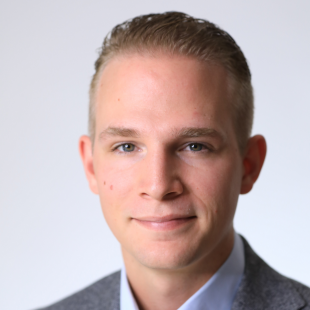MSc Advanced Chemical Engineering, 2019
What path has your career taken since graduation?
Since graduation, I have worked in two different roles, one as an engineering consultant in the surfactants industry (Stepan Company) and one as a project manager in the specialty chemicals and fermentation industry (Lonza Specialty Ingredients). I have also obtained my Project Management Professional (PMP) certification in the last few years.
My path to project management from engineering design is a result of understanding over the years where my skills are most useful and where I can have the most impact.
What is your current role and what does your work involve?
I am a project manager and construction manager for large Capital Expenditure projects. The projects I work on range from retrofitting existing production spaces to improve existing processes from an industrial hygiene or efficiency perspective to managing the construction of new buildings to expand production capabilities with new processes. As a project manager, you lead a team to successfully achieve project objectives within scope, on time and under budget. Most days I am running meetings, adjusting timelines, tracking budgets, placing purchase orders, and directing contractors in the field. A successful project usually results in a tangible change to your environment or perhaps a new product that was made possible by the project team’s efforts. It is a very rewarding feeling when these goals are obtained, especially given how long some projects can last.
What experiences do you feel helped you get to your current position?
All of your experiences blend together to add value to your life and professional career and sometimes those benefits are attributed indirectly. For instance, the path I chose in my degree leaned heavily on using different modelling software packages to analyse unit operations and processes. Though my current role does not involve daily sizing of equipment or performing these calculations, my experience in performing those tasks in the past is instrumental in my ability to oversee and approve the work performed by others to lead to eventual project completion. Overall, project management is about working in a team and resolving conflicts and issues under pressure and student life is rife with opportunity for learning how to deal with those types of experiences.
How have you used the skills and/or knowledge developed during your degree in your career?
For my career path, some of the most useful skills are a biproduct of the degree process itself. In particular, the ability to meet deadlines and perform under pressure, whether in an examination or a presentation translate directly to real-world professional situations I find myself in frequently. More directly though, the subject of my thesis was fermentation and I have coincidentally found myself working in that field, managing projects to install the very equipment I would discuss in my studies which surely puts me at a great advantage.
What do you think was the most valuable aspect of your time at Edinburgh in preparation for your career?
My time at the University of Edinburgh allowed me a pause in my life, as well as time to reflect and study subjects I would have not had exposure to professionally had I continued working in the specialty chemicals field prior to starting my degree. I believe allowing myself this time to reflect was crucial and really allowed me the ability to codify my sense of direction and discern where my interests truly lie.
What advice would you give to students who are interested in your area of work?
When you pursue a new role in engineering or project management, listen intently to the mechanics, maintenance staff and those tasked with solving problems by hand to develop a sense for the most efficient and long-lasting solutions. Their perspectives are unique and do not often traverse academic circles. For your ‘soft skill’ development, search out the supervisors of the happiest teams and determine what it is that makes them so successful. Emulate their abilities to lead and support their co-workers above all else.



